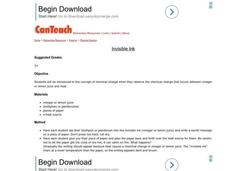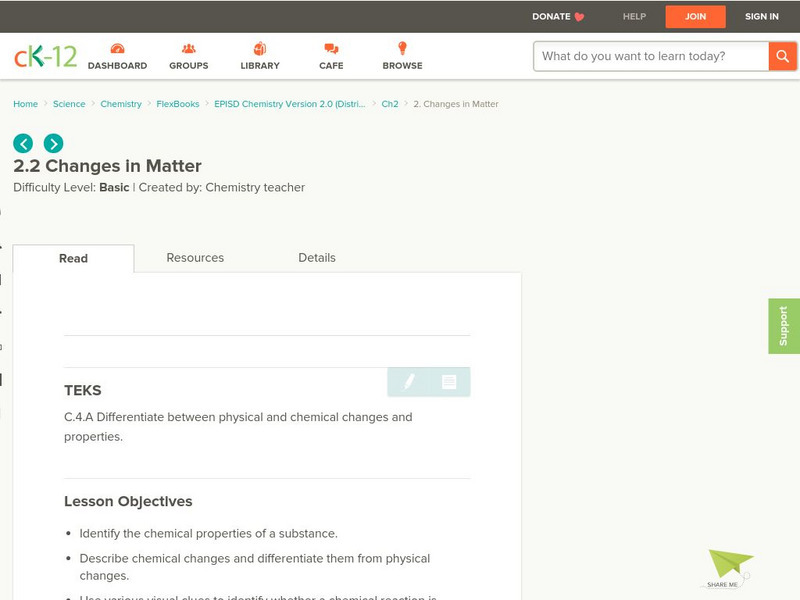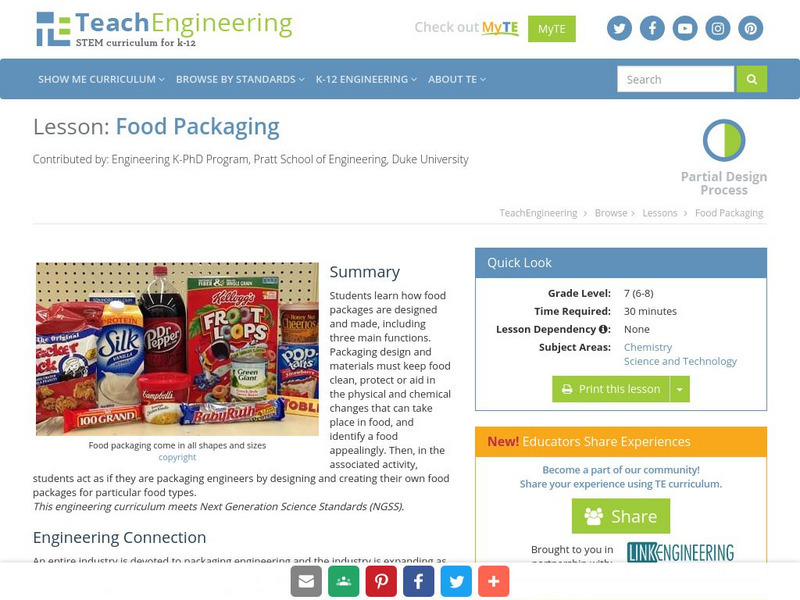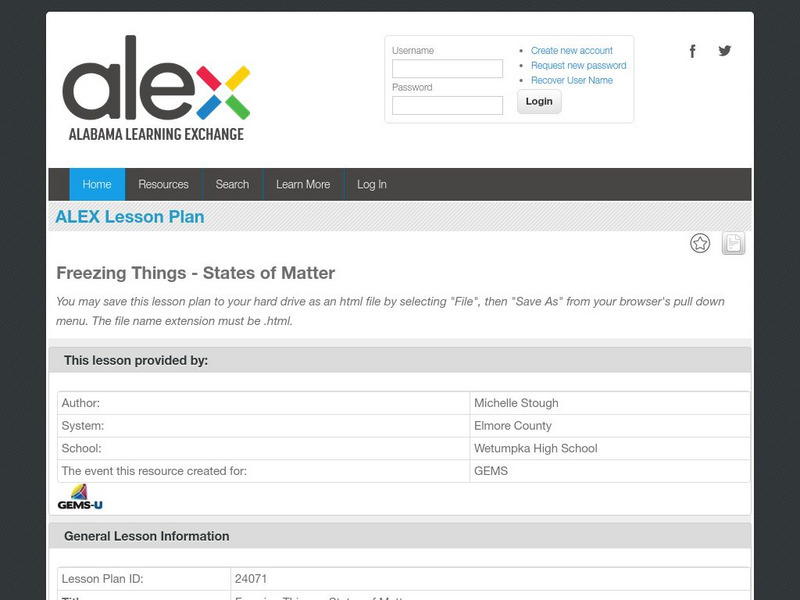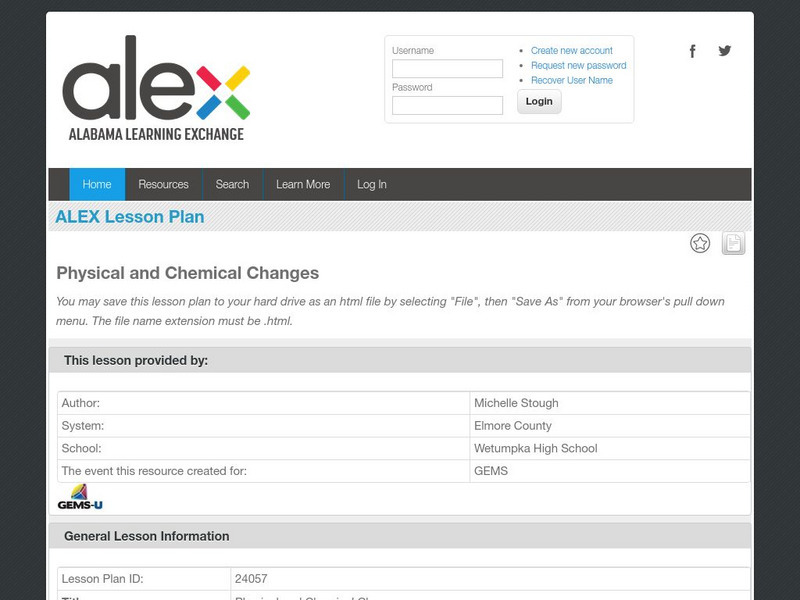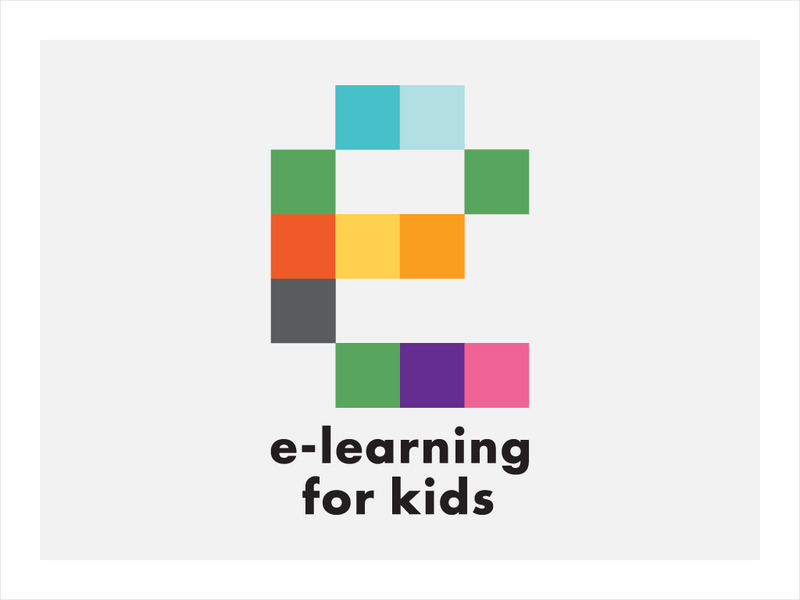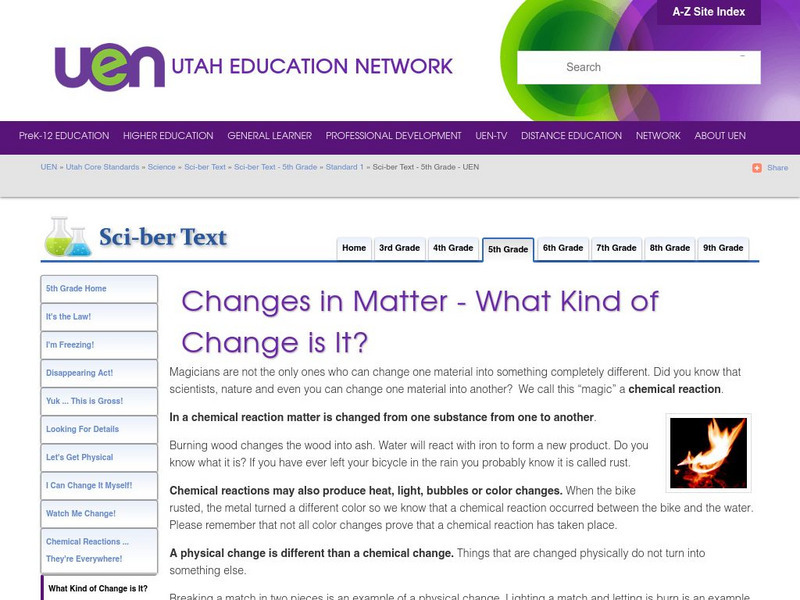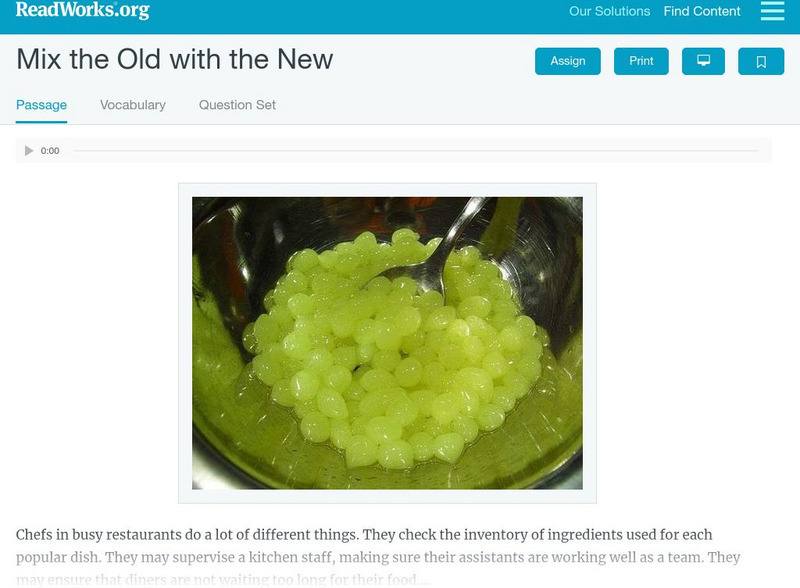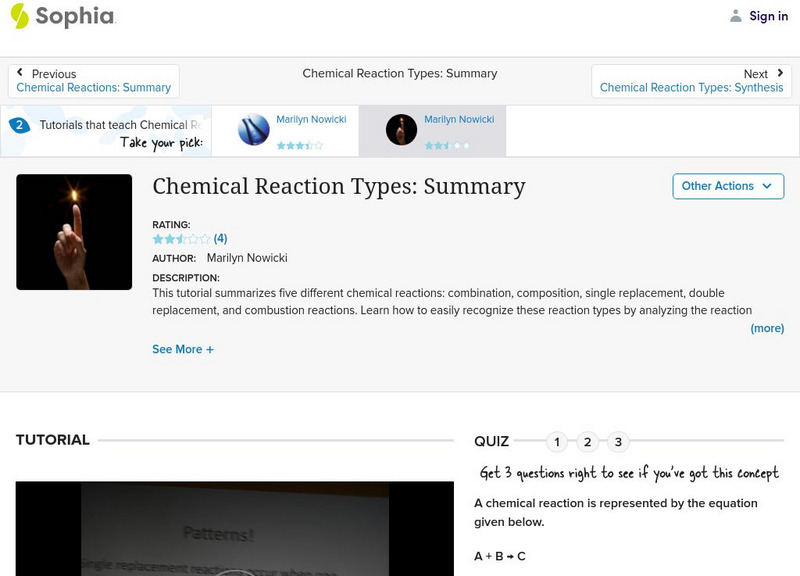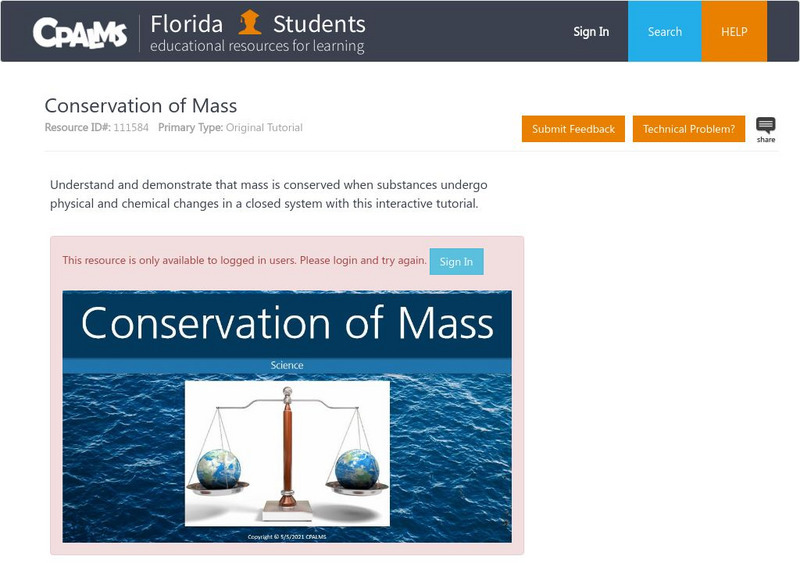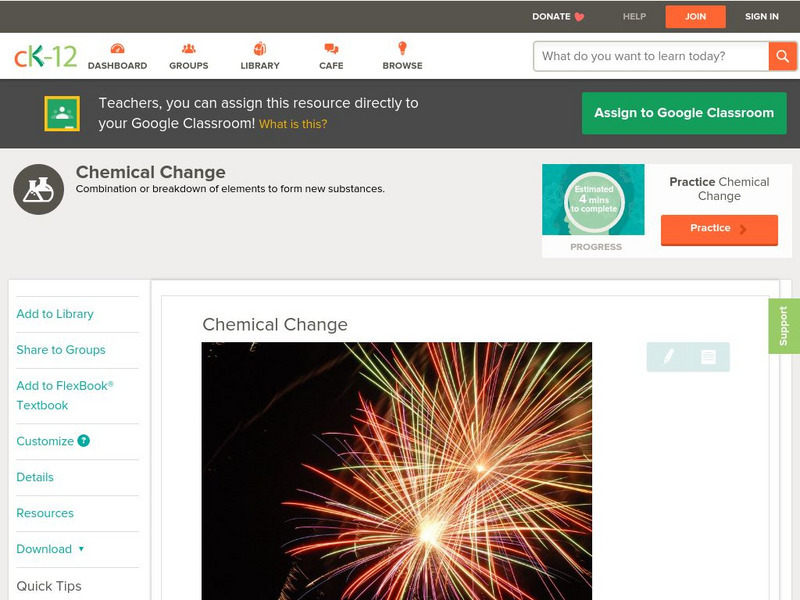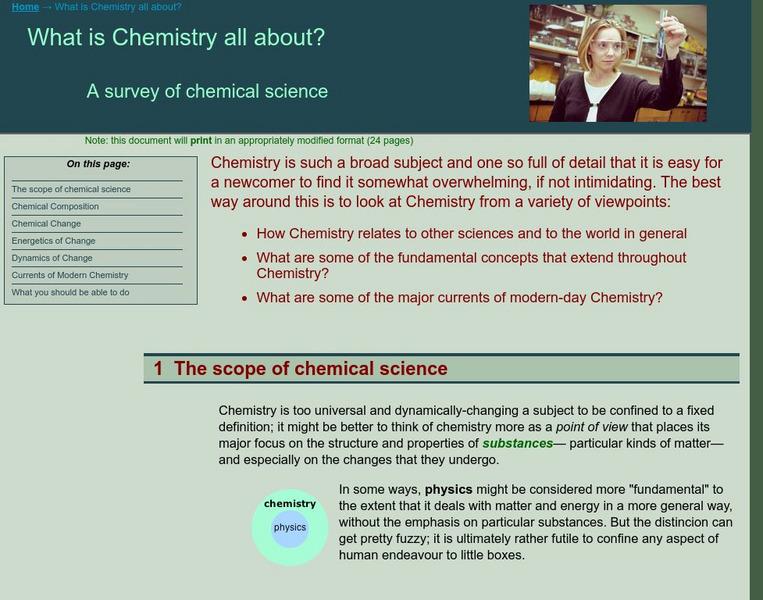Curated OER
Salt, To Use or Not To Use
Fifth graders develop a deeper understanding of chemical and physical changes. They explain how salt is made, used, and the affects it has on the body. They explain that salt in moderation is important to our health.
Curated OER
Invisible Ink
Students are introduced to the concept of chemical change when they observe the chemical change that occurs between vinegar or lemon juice and heat.
CK-12 Foundation
Ck 12: Changes in Matter
[Free Registration/Login may be required to access all resource tools.] In the following online tutorial students identify the chemical properties of a substance and describe chemical changes and differentiate them from physical changes....
TeachEngineering
Teach Engineering: Food Packaging
This lesson plan focuses on how food packages are designed and made. Students will learn three of the main functions of a food package. They will learn what is necessary of the design and materials of a package to keep food clean,...
Science Education Resource Center at Carleton College
Serc: Plastic Polymers: Investigating Their Flexibility
Students will use their prior knowledge about changes of matter to develop a hypothesis to test the physical properties of materials such as plastic (polymers) and how its chemical properties allow it to have unique physical properties.
Alabama Learning Exchange
Alex: Freezing Things: States of Matter
The class will go back over the Power Point presentation on chemical and physical properties. The teacher will then conduct numerous liquid nitrogen demos. This lesson plan is used early in the Chemistry course. The students love it....
Alabama Learning Exchange
Alex: Physical and Chemical Changes
The teacher will conduct the whoosh bottle demonstration to engage students. The class will then begin discussion of endothermic and exothermic physical and chemical changes. The students will then conduct the Science in Motion lab...
E-learning for Kids
E Learning for Kids: Science: Mediterranean Sea: What Are Reversible and Irreversible Changes?
Students will learn about reversible and irreversible changes in materials in this lesson.
Utah Education Network
Uen: Changes in Matter Chemical Reactions They're Everywhere
Can you distinguish physical changes from chemical reactions? You'll be presented with a number of pictures and asked to identify those which are examples of chemical reactions.
Utah Education Network
Uen: Changes in Matter What Kind of Change Is It?
Can you distinguish physical changes from chemical changes? After reading a brief summary of both types of changes, you'll be presented with some examples and asked to identify them.
Read Works
Read Works: Mix the Old With the New
[Free Registration/Login Required] An informational text about how cooking causes changes in matter. A question sheet is available to help students build skills in reading comprehension.
Sophia Learning
Sophia: Chemical Reaction Types: Summary
A video tutorial illustrating the basic types of chemical reactions commonly seen in general chemistry. [5:04]
CPALMS
Florida State University Cpalms: Florida Students: Conservation of Mass Tutorial
Learn how mass is conserved in physical and chemical changes.
CK-12 Foundation
Ck 12: Physical Science: Chemical Change
[Free Registration/Login may be required to access all resource tools.] Definition of chemical change and examples, signs of chemical change and how it can be reversed.
E-learning for Kids
E Learning for Kids: Science: Greek Theater: What Are Reversible and Irreversible Changes?
Join Leander in his chemistry lesson, and learn about the change of different types of substances.
Alabama Learning Exchange
Alex: Name That Change!
This lesson teaches students to distinguish between physical and chemical changes. Students will view an interactive slideshow presentation and then conduct experiments to discern physical and chemical changes.
Alabama Learning Exchange
Alex: What's the Matter: Concentration Game
What's the Matter? is a guided inquiry lesson on classification of matter, physical and chemical properties, and physical and chemical changes. There are two parts to this lesson: (a) concentration game for definitions and (b)...
Alabama Learning Exchange
Alex: Chemical Reaction in a Bag
Students will use scientific methods in creating and observing a chemical reaction.
Utah Education Network
Uen: Hot and Cold
Learners study the energy associated with physical and chemical changes. The activity consists of observing nine phenomena.
Utah STEM Foundation
Utah Stem Action Center: Changes in Matter
The goal of this activity is to develop and use a model to describe that matter is made of particles on a scale that is too small to be seen. You will be making observations of changes supported by a particle model of matter.
Utah Education Network
Uen: Recognizing Chemical Reactions
Young scholars will add 4 chemicals to a beaker and observe the changes that take place. They will classify them as physical or chemical changes.
Simon Fraser University
Chem1 Virtual Textbook: Chemical Change
Chemical change is a section of a larger overview on Chemistry, covering a variety of aspects. This section focuses on chemical change including the difference between chemical change and physical change.
Other
The Science House: Combustion
In this experiment, students will observe that the weight of the product of combustion is greater than that of the starting material. Teacher's notes address the key concepts of this experiment.
Other
The Science House: Ziptop Bag Chemistry
In this experiment, three reactions are performed in a sealed Ziploc bag so that they can be observed. Students identify whether physical or chemical change has taken place.



